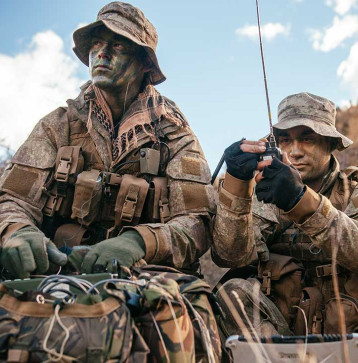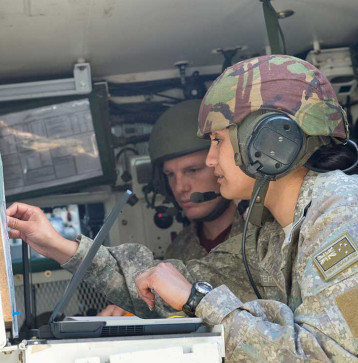
Electronics Technician
Skip to section:
About the role Career progression and training Salary and benefits Entry requirementsAs an Electronics Technician you are responsible for maintaining the NZ Army’s ‘eyes and ears’.
- ServiceArmy
- SpecialisationEngineering and Technical Trades
- LocationLinton or Burnham Camps
-
Starting Trade Training$64,177
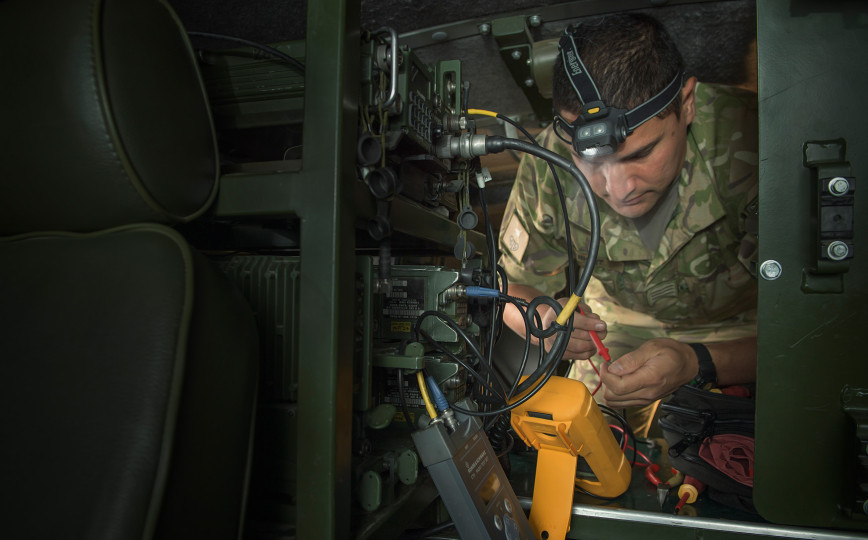
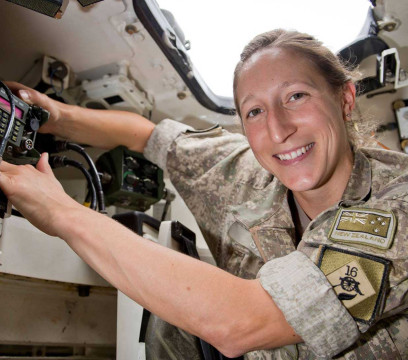
About the role
As an Electronics Technician you are responsible for maintaining the NZ Army’s ‘eyes and ears’. You will work on sophisticated communications, night vision and sighting systems, as well as the electronic systems on the NZLAV.
You’ll work in a variety of challenging environments, and you will gain a trade qualification backed up with a variety of unique experiences working both within NZ and overseas.
Job on base
As an Electronics Technician you will be responsible for the maintenance and repair of over 200 specialised electronic and optical systems. This role involves a lot of fault-finding and diagnosis to ensure that NZ Army electronic equipment is maintained to high operational standards. You will inspect, test, maintain and repair communications systems and night vision equipment utilising the latest automatic test equipment designed for purpose. You will work on a diverse range of equipment, from the IEDD Bomb Robot, mine detectors and laser range finders, to the GPS / Inertial Navigation / Fire Control systems on the NZLAV.
You will also work with front line units, repairing equipment on training exercises. You will be the expert on electronic equipment and will be the go to person if others have questions about equipment they are using.
Job on deployment
Electronics Technicians deploy on a variety of overseas exercises and deployments in support of operational units and activities.
While on deployment you could be responsible for facilitating the repair of NZLAV, radio and night vision equipment as well as providing relevant maintenance support advice. You will also complete technical inspections to ensure the equipment is operational.
On an overseas deployment or exercise you are the subject matter expert for all electronic, instrumentation or radar based equipment. You’ll be required to work independently and see your task through to completion.
You will carry out periodic inspections and testing to ensure that equipment is functioning at full capability.
Electronics Technicians are currently deployed to Iraq, and historically they have deployed whenever/wherever the NZDF has. In recent years they have deployed to Afghanistan, East Timor and the Solomon Islands, as well as participating in training exercises in Australia, Hawaii, Canada and the USA.
Career progression and training
Career Progression
Basic Training
Job Training
Ongoing Training
Specialist Training
As your career progresses, you’ll move on from being an apprentice to being a fully qualified Electronics Technician. Later you will be given greater responsibilities in managing and maintaining specialist equipment, as well as the management of apprentices.
There is also the potential to move onto being an Electronics Artificer , where you’ll be required to perform military command and leadership duties supervising a small team of personnel. You may also be appointed as an instructor within the Electronics Wing of the Trade Training School in Trentham.
Training to further develop leadership and personnel management skills will enable you to become more effective within the wider organisation.
Upon successful enlistment into the Army you will be posted to Waiouru Army base. Here you will do 16 weeks of basic military training to find out if you have what it takes to be in the Army, and learn various subjects including:
- Organisation and Administration
- Army Customs and Protocol
- Drill and Parades
- Military Field Skills and Weapon Training
- First Aid
- Physical Fitness
RNZALR BASIC TRAINING
Your initial trade training will be conducted at the Trade Training School (TTS) in Trentham camp near Wellington. This is a five-week course where you will be introduced to the Royal NZ Army Logistic Regiment.
PHASE ONE: NATIONAL CERTIFICATE IN ELECTRONIC ENGINEERING, PART 1
This 30 week course is conducted at the Weapons Engineering School (WES), Devonport Naval Base, and is the start of your academic training. It is here that you will begin collecting trade related unit standards towards your National Certificate in Electronic Engineering qualification.
JUNIOR ELECTRONIC TECHNICIANS COURSE
This 12 week course is held at TTS Trentham, and is designed to give you an insight into the repair and maintenance of optical equipment, workshop documentation and procedures, general engineering skills, High Reliability Hand Soldering (HRHS) and Cable Repair techniques.
This course culminates in the student constructing, from basic principles, an Electronic Switched Mode Power Supply which they can retain as their own.
INTERMEDIATE ELECTRONIC TECHNICIAN COURSE
This 14 week course is conducted at TTS Trentham, and is designed to develop your repair and maintenance skills on more advanced electronic equipment’s such as Image Intensifiers, Thermal Imagers, Laser Range Finders and multiple communication systems.
PHASE TWO: NZ CERTIFICATE IN ELECTRONIC ENGINEERING, PART 2
This 48 week course is conducted at the WES, Devonport Naval Base, and will see you finish off your academic training. It is here that you will be awarded your NZ Certificate in Electronic Engineering Level 4.
SENIOR ELECTRONIC TECHNICIANS COURSE
This 14 week course is conducted at TTS Trentham, and is designed to train you in the repair and maintenance of NZLAV, covering GPS, Gyros, Gun Drive Electronics, Thermal Imagery, Laser Rangefinders and Laser Warning Systems to name but a few, as well as more advanced communications systems.
ADVANCED ELECTRONIC TECHNICIAN COURSE
This 7 week course is conducted at TTS Trentham, and covers advanced and specialist electronic equipment’s including the bomb disposal robot and the javelin anti-tank missile as well as a more in depth look into the repair of the NZLAV electronic modules.
Electronics Technicians will also learn maintenance and repair on NZ Army bomb disposal robot and become crew commanders of NZLAV(R), which is the workshop’s specialist recovery NZLAV.
Future courses include the repair and maintenance of specialist equipment such as the indirect fire prediction system used by the Artillery Regiment, as well as more sophisticated equipment used by the NZSAS. There is also the opportunity to conduct training in the repair of bio-medical equipment with the Australian Army in Melbourne.
Between the many courses, you will be posted to units to further develop your skills and experience and receive on the job training.
As your career progresses there will be an opportunity to study further towards a NZ Diploma in Electronic Engineering, Level 6.

Salary and benefits
Careers in the Army are well-rewarded, diverse and exciting. As you become more experienced and move up through the ranks, gaining additional skills and qualifications, your salary will rise accordingly.
$50,597
Under Initial Training
$64,177
Starting Trade Training
$129,061
Future Potential Earnings
Figures updated on July 1st 2023
Benefits and allowances
Earn a competitive salary while training or learning your trade, along with additional allowances for time spent in the field, at sea, overseas, or deployed on operations.
In addition to salary and allowances, other benefits of joining the New Zealand Defence Force include:
Access to your Service marae or tūrangawaewae
Sponsored tertiary study programmes at all levels
Free access to gyms and swimming pools on camp and bases
Opportunities to travel
Free and subsidised medical and dental care
Subsidised food and accommodation on camps and bases
Free and subsidised insurance cover
Help to buy a home and save for retirement
Entry requirements
Basics
Education
Fitness and Medical
Citizenship
Period of Service
- You must be at least 17 years of age
- Meet the citizenship and security requirements to gain SV security clearance for this trade
- Any practical experience repairing radio communications and sighting equipment will make you a more competitive applicant
- A Class 1 restricted licence is preferred, but is not compulsory.
NCEA Level 2 certificate
Find out more about the NCEA levels and certificate requirements
- You must be medically fit for service.
- No decreased colour perception.
There are strict citizenship and security requirements to gain the required SV security clearance for this trade.
Find out if you’re eligible here.
Once you have completed training you will be required to give a two year return of service to the NZ Army.
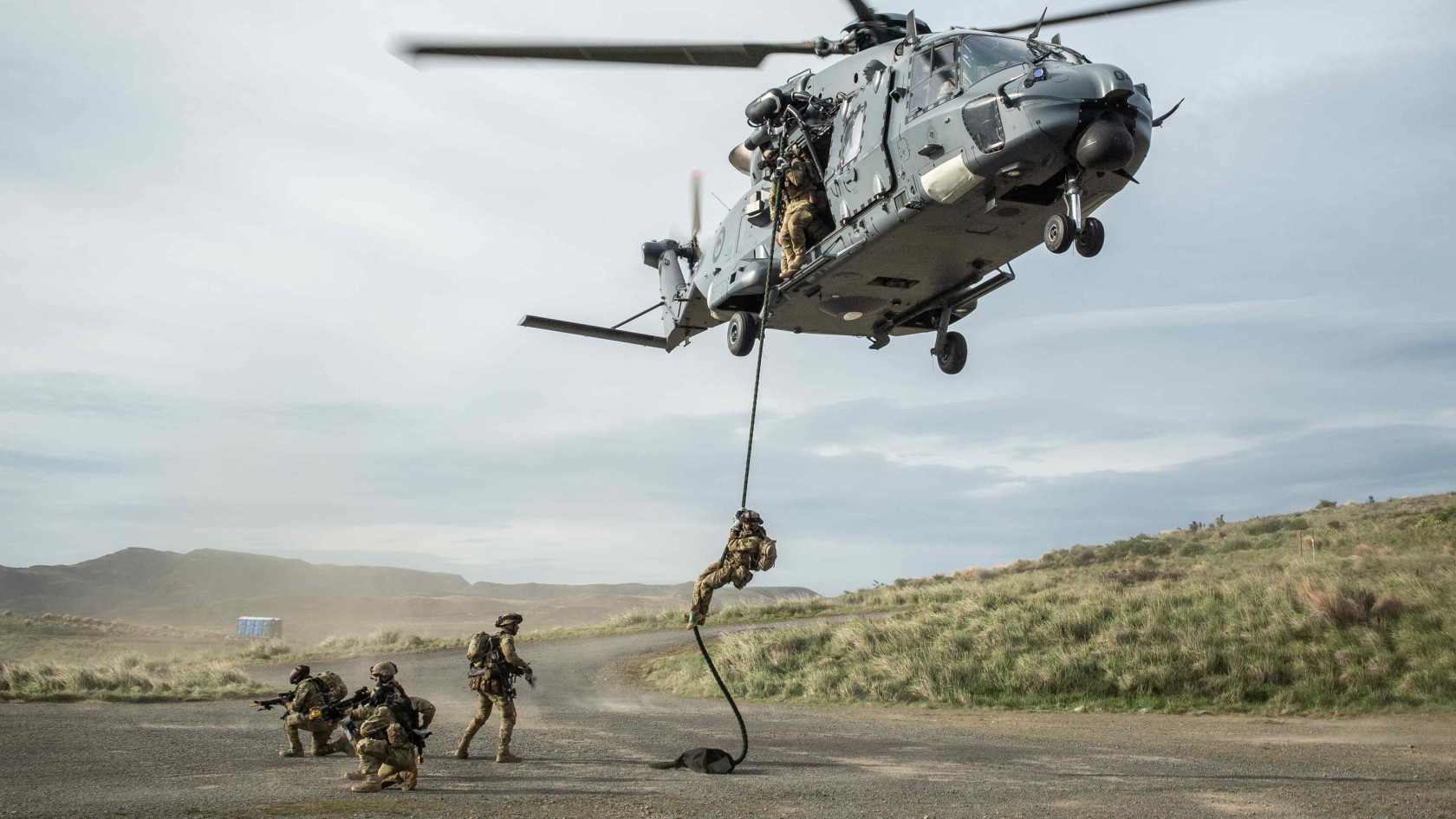
Ready to start your Army career?
Other jobs you might like
You can also browse jobs by specialisation to narrow down your search.
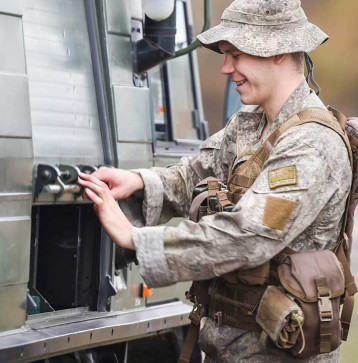
Applications Open
